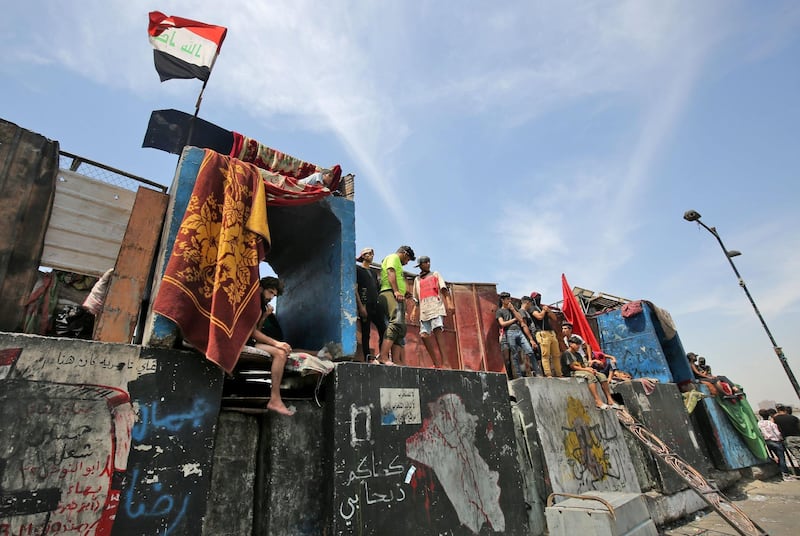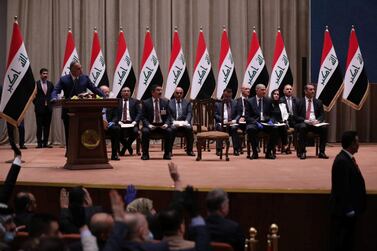The anti-government protests that have rocked Iraq's southern provinces since last year are now a co-ordinated movement that will soon put forward a unified list of demands, activists said in an online briefing on Friday.
The protests abated amid a lockdown to contain the country's coronavirus outbreak but flared up again last week after the appointment of former national intelligence chief Mustafa Al Kadhimi as prime minister.
“We will not stop until our demands are met and if we feel that Prime Minister Mustafa Al Kadhimi’s government is not making any changes to the system then we will aim to oust his cabinet,” said Hussein Al Ghurabi, a lawyer and human rights activist from Nasiriyah, a southern city that has seen the largest protests along with the capital, Baghdad.
Thousands of Iraqis took to the streets in Baghdad and southern Iraq last October to protest against corruption, unemployment, poor living standards and foreign interference. The mostly young protesters accuse the political establishment of rampant corruption and are demanding an end to a political system that is divided along sectarian and ethnic lines.
In response, the former prime minister Adel Abdul Mahdi resigned last November but Mr Al Kadhimi was only confirmed as his successor last week after two previous candidates were rejected by parliament due to differences among the various political factions including Shiite groups aligned to Iran, Kurdish and Sunni parties, as well as minority groups.
“Mustafa Al Kadhimi’s nomination was not our choice, it was the choice of political parties,” Mr Al Ghurabi said
He said co-ordination between the protests in various cities movement was unprecedented. “This was not the case before. We will publish a joint statement addressed to Mr Al Kadhimi showcasing our agreed demands.”
The protesters' demands were in line with the Iraqi constitution and their democratic rights, Mr Al Ghurabi said.
Activists who spoke during the briefing also called for justice for the nearly 800 protesters killed and 25,000 injured in a brutal crackdown by security forces.
They said they had documented the unlawful use of lethal force to disperse protests, including military-grade tear-gas grenades, live ammunition and sniper attacks.
After assuming office, Mr Al Kadhimi ordered an investigation into the deaths and the release of detained activists and demonstrators.
Mr Al Ghurabi urged the new prime minister to hold those responsible accountable and to seek justice for the lives lost during the October protests.
Ammar Al Kazaaly, an activist and human rights defender from Diwaniyah, another southern city, said protesters including himself had been subjected to intimidation, threats and false accusations since the movement started.
“We will stay in the square and in our tents until Mustafa Al Kadhimi’s government works on giving us our rights and implements rules and regulations,” Mr Al Kazaaly said.
“The government must meet our demands in a specific timeframe. Let’s see to what extent Mustafa Al Kadhimi is willing to how us how serious he is in meeting our demands,” he said.
“Our liberal voices and flags is all that we have; we stand tall and resist the threats and intimidation."
Hisham Al Mozani, a human rights defender who is monitoring and documenting violations against protesters in Baghdad, said the government’s inability to protect the public had resulted in an increasing number of forced disappearances and intimidation.
“If we look at international reports we can see that the government is not conducting serious investigations,” Mr Al Mozani said, adding that Mr Al Kadhimi faces serious an array of challenges including getting justice for protesters.
“He must work on helping the protesters and compensating them for their suffering,” he said.
Hanaa Edwar, an Iraqi civil rights activist for more than five decades, said October's uprising had impacted the political process in Iraq by putting focus on the principles of citizenship.
"It has shown that a united Iraqi citizenship can change the nature of the ethnic sectarian system we have had since 2003. One that was based on looting the wealth of the country," she said.







